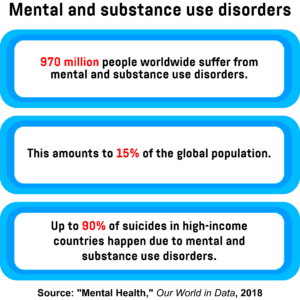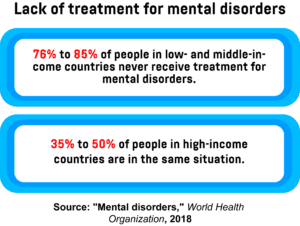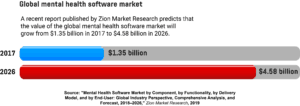- Up to 85 per cent of people with mental disorders receive no treatment
- Smartphones provide easy and convenient access to mental health services
- Meditation apps are growing in popularity
- Research suggests that meditation can be beneficial to mental health
- Are meditation apps the future of mental health care?
Mental and substance use disorders are one of the world’s most prevalent health issues, estimated to affect more than 970 million people around the world, or 15 per cent of the global population. However, considering that mental health disorders remain widely under-reported, the actual prevalence is likely to be much higher than this estimate.

Mental illness can take many different forms, ranging from milder conditions like anxiety to more serious disorders like depression, bipolar disorder, and schizophrenia. It can dramatically affect a person’s quality of life and even lead to death in the most severe cases. While mental health disorders rarely result in death directly, they’ve been linked to a large number of indirect deaths from suicide and self-harm. In fact, it’s estimated that up to 90 per cent of suicide deaths in high-income countries result from underlying mental and substance use disorders.
Up to 85 per cent of people with mental disorders receive no treatment
There are a number of effective treatment options for mental health disorders, including drugs, cognitive behaviour therapy, and psychotherapy. Unfortunately, not everyone who needs treatment has access to it. According to the World Health Organization (WHO), between 76 and 85 per cent of people with mental disorders in low- and middle-income countries receive no treatment for their condition.

The situation is only slightly better in high-income countries, where between 35 and 50 per cent of people are in a similar plight. The lack of awareness about the issue and the social stigma surrounding mental illness are the main reasons why mental health disorders remain under-reported, with people often choosing not to seek professional help out of fear of being ridiculed or shunned by their community. As a result, people are increasingly looking for help in a rather unusual place – their smartphones.
Smartphones provide easy and convenient access to mental health services
As smartphones take on an increasingly prominent role in our lives, people are starting to use them to access all kinds of services, including those pertaining to mental health. “Each generation is getting progressively more mobile-native, so I think we’re going to see people become increasingly more accustomed, or predisposed, to a higher level of comfort in seeking care online,” says John Prendergass, an associate director at Ben Franklin Technology Partners’ healthcare investment group.
In recent years, the number of smartphone apps focused on mental health has increased significantly. According to a recent report published by Zion Market Research, the global mental health software market was valued at approximately $1.35 billion in 2017 and is predicted to reach $4.58 billion by 2026. Providing easy and convenient access to mental health services, these apps are particularly important in areas where access to such services is limited or non-existent. Meditation apps in particular have proven remarkably popular with consumers. They offer guided meditation, deep breathing exercises, and calming sleep stories designed to help people relax, feel less anxious, and sleep better. There are currently more than 1,000 meditation apps on the market, which generate hundreds of millions of dollars in revenue per year. “With the arrival of the smartphone, millions of people are now discovering that mental training is possible. This is analogous to our parents’ and grandparents’ generations discovering the benefits of physical exercise,” explains the American neuroscientist Sam Harris.
Meditation apps are growing in popularity
With more than 40 million downloads worldwide and over 1 million paying subscribers, Calm is currently the most popular meditation app. In addition to being the top grossing health and fitness app on iOS, with annual revenue of $150 million, Calm also recently became the first app of its kind to achieve a valuation of over $1 billion. The app offers guided meditation sessions, breathing exercises, sleep stories, and soothing background tracks to help you sleep better. While the app is free to download, accessing most of the content requires an annual subscription of $60.
With more than 30 million downloads, 1 million paying subscribers, and $100 million in annual revenue, Headspace is Calm’s biggest competitor. It offers guided meditation, animations, articles, and videos that teach people how to manage stress and anxiety and get a better night’s rest. Headspace includes a free Basics course that teaches you the fundamentals of meditation and mindfulness. The rest of the content is available only to paying subscribers, with users able to choose between monthly, yearly, and lifetime subscriptions.
For those unwilling to pay a hefty subscription fee, Insight Timer may be the best option to try their hand at meditation. The app offers 5,000 free guided meditations from more than 1,000 meditation teachers, as well as more than 750 soothing music tracks. It also allows users to create a custom meditation practice that suits their needs and interests. Buddhify is another popular meditation app. Unlike other apps on this list, Buddhify offers meditation exercises based on what you’re doing at the time. Whether you’re walking, eating, working, trying to sleep, or scrolling through Instagram, the app will serve a meditation or mindfulness exercise that’s perfectly suited for that activity. Other popular meditation apps include Omvana, 10% Happier, Stop, Breathe & Think, and Simple Habit. Even celebrities decided to get in on the act, with Oprah Winfrey and Deepak Chopra releasing a meditation app of their own called 21-Day Meditation Experience.
Research suggests that meditation can be beneficial to mental health
The use of meditation has skyrocketed among US adults in the last decade, growing from 4.1 per cent in 2012 to 14.2 per cent in 2017. After exceeding $1 billion for the first time in 2016, the US meditation market is expected to continue growing in the future and is predicted to reach $2.08 billion by 2022. “Over the past 20 years, meditation and mindfulness-based programs have become increasingly important to Westerners. Doctors are embracing meditation not because they think it’s hip or cool but because scientific studies are beginning to show that it works, particularly for stress-related conditions,” says John LaRosa, the research director at Marketdata Enterprises, Inc.
But does meditation really work the way its proponents say it does? Over the years, numerous studies have been conducted to determine how meditation affects the mind, with researchers finding plenty of evidence to suggest that practicing meditation can reduce blood pressure, as well as symptoms of anxiety and depression, and even help people get a better night’s sleep. Meditation apps themselves haven’t been as extensively studied, with only one of them, Headspace, having been the subject of a scientific study, which indicated that the app could decrease depression and increase positive emotions in users. However, it’s probably safe to assume that other meditation apps can produce a similar outcome as well.
While meditation has proven effective in alleviating symptoms of anxiety and depression, it’s important to stress that it won’t be of too much help for people affected by more serious mental health disorders. As such, it shouldn’t be viewed as a replacement for traditional mental health care, but rather as a complement to it. People also need to be careful not to put too much stock into what these apps can do, as it could give them a false sense of security. If at any time they start to feel overwhelmed, they should turn to a professional for help, rather than counting on the app to make it go away. Critics are also quick to point out the irony in using smartphone apps to escape digital distractions.
Are meditation apps the future of mental health care?
The hectic pace of modern life, the 24-hour news cycle, the depressing nature of social media, and climate change-related stress have resulted in a major increase in anxiety and depression rates around the world. Unfortunately, whether due to a lack of access to mental health services or the social stigma associated with mental illness, a large proportion of people affected by these conditions don’t receive any treatment. As a result, people are increasingly turning to their smartphones for help.
The popularity of meditation apps has increased significantly in recent years. Offering guided meditation, deep breathing exercises, and calming sleep stories designed to help people relax, feel less anxious, and sleep better, meditation apps have proven effective in alleviating symptoms of anxiety and depression. However, it’s important that they aren’t viewed as a replacement, but rather as a complement to traditional mental health care. That’s especially true for people affected by more serious mental health disorders, who would be better served by seeking professional help. On the other hand, if you’re just looking for something to relieve some stress and anxiety after a hard day’s work, meditation apps could be a good place to start.
Share via:



